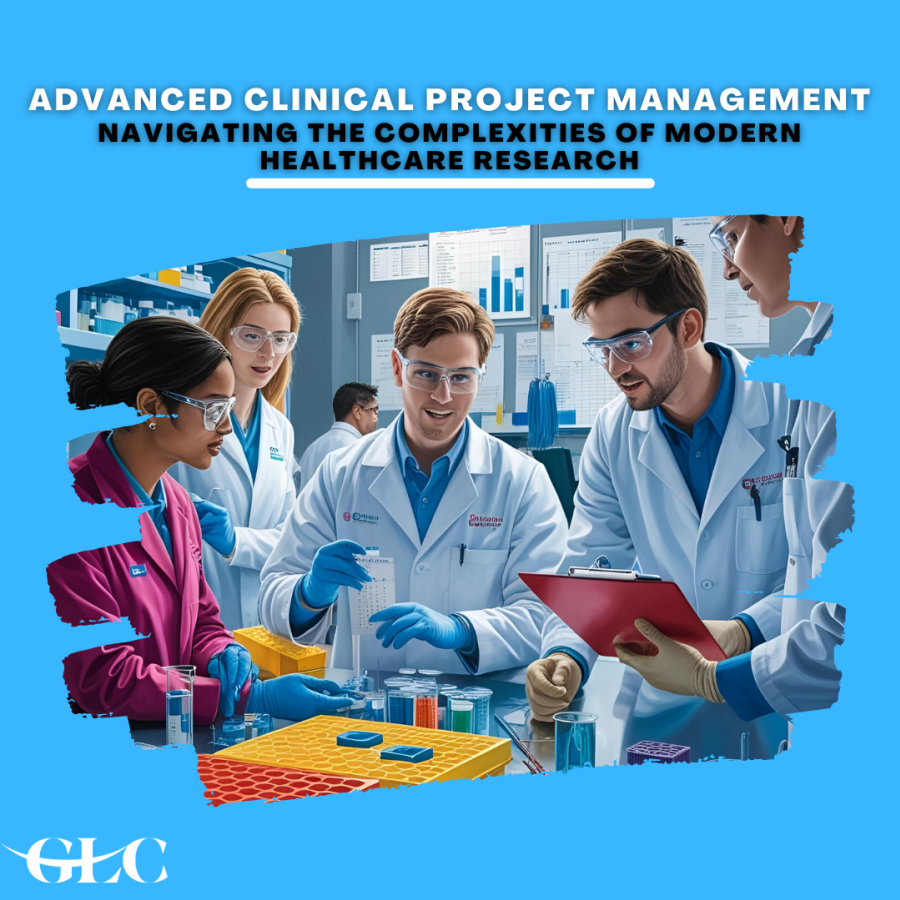Free knowledge to monitor the world of events. Have a look at our must read Blogs on Pharma, Finance, HR, Health and Cross Industry.
Advanced Clinical Project Management: Navigating the Complexities of Modern Healthcare Research
2022-08-16
Clinical project management is a cornerstone of successful healthcare research with clinical trials being properly planned, executed, and analyzed efficiently and effectively.
Clinical project management is a cornerstone of successful healthcare research with clinical trials being properly planned, executed, and analyzed efficiently and effectively. The CPM position has evolved significantly as clinical trials become ever more complicatedacross sites, nations, and disease states. Advanced clinical project management is a combination of strategic guidance, in-depth regulatory know-how, advanced data analysis, and cutting-edge technology to address the demands and challenges of modern clinical research.
In this blog, well explore the key elements of advanced clinical project management, including emerging trends, essential skills, and best practices for managing increasingly complex clinical trials.

1. The Evolving Role of the Clinical Project Manager
At its core, clinical project management is the coordination of the operations and logistics of clinical trials to have them completed on time, within budget, and in compliance with regulatory guidelines. However as clinical trials have grown more complex, the CPM's function has expanded far beyond scheduling and tracking.
In progressive clinical project management, CPMs are required to:
- Develop Strategic Plans: Rather than simply following pre-established protocols, CPMs today develop customized strategies for each trial and connect trial objectives to company objectives. This includes risk management, resource allocation, and performance forecasts.
- Facilitate Cross-functional Collaboration: Clinical trials entail input from multiple stakeholdersclinical operations, data management, regulatory affairs, medical affairs, etc. Advanced CPMs must facilitate seamless coordination between these departments so that all aspects of the trial are coordinated.
- Drive Innovation: New technologies, such as decentralized trials (DCTs) and eSource data capture, are revolutionizing clinical research. CPMs in higher-level positions will need to drive the adoption of these innovations in trial designs, offering greater flexibility and efficiency.
2 . Key Challenges in Advanced Clinical Project Management
Conducting a clinical trial is no simple feat, and advanced CPMs must contend with a variety of challenges including:
- Globalization of Clinical Trials: Clinical trials today are typically conducted across several countries and regulatory environments. This increases the complexity of coordinating logistics, collecting data, and compliance. Advanced CPMs must be knowledgeable about regional regulations and cultural sensitivities and still remember the larger-picture goals of the trial.
- Patient Recruitment and Retention: As clinical trials become more complex, participant recruitment and retention can be a significant challenge. Advanced project managers will utilize advanced analytics, patient engagement platforms, and digital tools to facilitate enrollment and maintain participant engagement throughout the trial period.
- Risk Management: Clinical trials have risks associated with them, from delays due to regulatory concerns to safety concerns regarding investigational drugs. Advanced project managers use proactive risk assessment methods, predictive analytics, and real-time monitoring to prevent risks from becoming issues.
- Data Integrity and Management: With the sheer volume of data generated in modern clinical trials, data integrity and quality need to be ensured. Advanced CPMs work with data managers to put in place good data governance practices and compliance with Good Clinical Practice (GCP) guidelines.
3. Technological Advancements in Clinical Project Management
The era of digital age has brought with it several tools and technologies that have revolutionized clinical project management. From electronic data capture (EDC) systems to artificial intelligence (AI)-driven predictive models, technology is at the forefront of simplifying the entire clinical trial process.
- Decentralized Clinical Trials (DCTs): DCTs enable remote monitoring and engagement, significantly enhancing patient access and reducing the logistics of conventional trials. Thus, CPMs must be very capable of managing virtual and hybrid trial designs, balancing patients' interests against regulation and data protection demands.
- Data Analytics and Predictive Tools: Advanced project management relies greatly on data-driven decision-making. Predictive analytics allow trial timelines, costs, and potential risks to be forecasted, allowing the CPM to proactively make alterations. Real-time data dashboards provide for ongoing site performance, patient recruitment, and protocol compliance monitoring.
- Artificial Intelligence (AI): AI is revolutionizing clinical trials by conducting mundane tasks such as data inputting, site selection, and even patient monitoring. This enables CPMs to focus on more strategic-level work, while AI-powered algorithms can predict trends, identify likely risks, and optimize trial deployment.
4. Essential Skills for Advanced Clinical Project Managers
In order to succeed in this changing environment, clinical project managers need a mixed skill set that combines clinical expertise with effective leadership and technical ability. Key skills include:
- Leadership and Team Management: Senior CPMs should motivate and guide cross-functional teams, give them direction, and align them with the trial objectives. This involves strong communication, problem-solving, and conflict-resolution skills.
- Project Planning and Execution: While project management is the focal point of the CPM role, master CPMs must be proficient at creating intricate project plans, managing resources, tracking progress, and making adjustments in real-time to keep the trial on track.
- Regulatory Awareness: Evolving according to complex regulatory environments is mandatory. Advanced CPMs should be up-to-date with global rules such as ICH GCP, FDA, EMA, and regional policies to maintain compliance and avoid delay or fine.
- Risk Management: Advanced CPMs should have the capability of identifying potential risks at every step of the trial, from the design to execution, and must take steps to mitigate such risks. This would include planning against unforeseen complications like adverse events or regulatory action.
- Communication and Stakeholder Management: Effective communication is key in advanced clinical project management. CPMs need to effectively communicate with sponsors, regulatory authorities, investigators, and other stakeholders to keep everyone informed and aligned.
5 . Best Practices for Advanced Clinical Project Management
To ensure that clinical trials are successfully executed and deliver valuable results, advanced CPMs should follow these best practices:
- Implement Agile Methodologies: Because of the complexity and evolving nature of clinical trials, using agile project management techniques can lead to greater responsiveness and flexibility. By breaking the trial down into discrete and manageable phases, CPMs are in a position to respond more quickly to difficulties and make any required adjustments.
- Leverage Early Risk Assessments: Conduct thorough risk assessments at the start of the project life cycle to identify possible obstacles. Develop contingency plans and be prepared to implement these plans where necessary.
- Ensure Patient-Centricity: Clinical project management with best practices should emphasize patient engagement and patient experience. This can be achieved through technology platforms, improved communication, and making trial participation more accessible by offering alternative models such as telemedicine consultations or home delivery of investigational products.
- Promote Continuous Learning: The clinical research industry is continually evolving. Sophisticated CPMs need to be committed to continuous professional learning through attending conferences, reading industry publications, and receiving training on new technology and regulatory changes.
Conclusion
Advanced clinical project management is a dynamic and intricate discipline that requires high expertise and flexibility. While decentralized trials, AI-based technology, and global studies shine brightly, clinical project managers are at the forefront of driving efficiency and innovation in clinical research. Through the adoption of advanced technology, building leadership skills, and proactively managing risks, CPMs are not only assuring single-trial success but also building the future of healthcare.
With the ongoing development of clinical trials, the role of a clinical project manager will become even more crucial in shaping the destiny of medical research and improving the outcomes of patients.
Do you want to understand more? Join our upcoming Advanced Clinical Project Management Masterclass which is scheduled for 19-22 May 2025.
By Shara Najimudeen, Digital Marketing Executive, GLC Europe, Colombo Office, Sri Lanka.
Get a feel for our events

Training Program for CMC Leaders - EU edition
14th September 2026 - 09th April 2027
Rich with practical insights and real-world applications
learn more >>
Training Program for CMC Leaders - US edition
14th September 2026 - 09th April 2027
Rich with practical insights and real-world applications
learn more >>
Advanced Stability Testing of Pharmaceuticals MasterClass - US edition
24-27 February, 2026
Increase the likelihood of studies receiving regulatory approval
learn more >>












